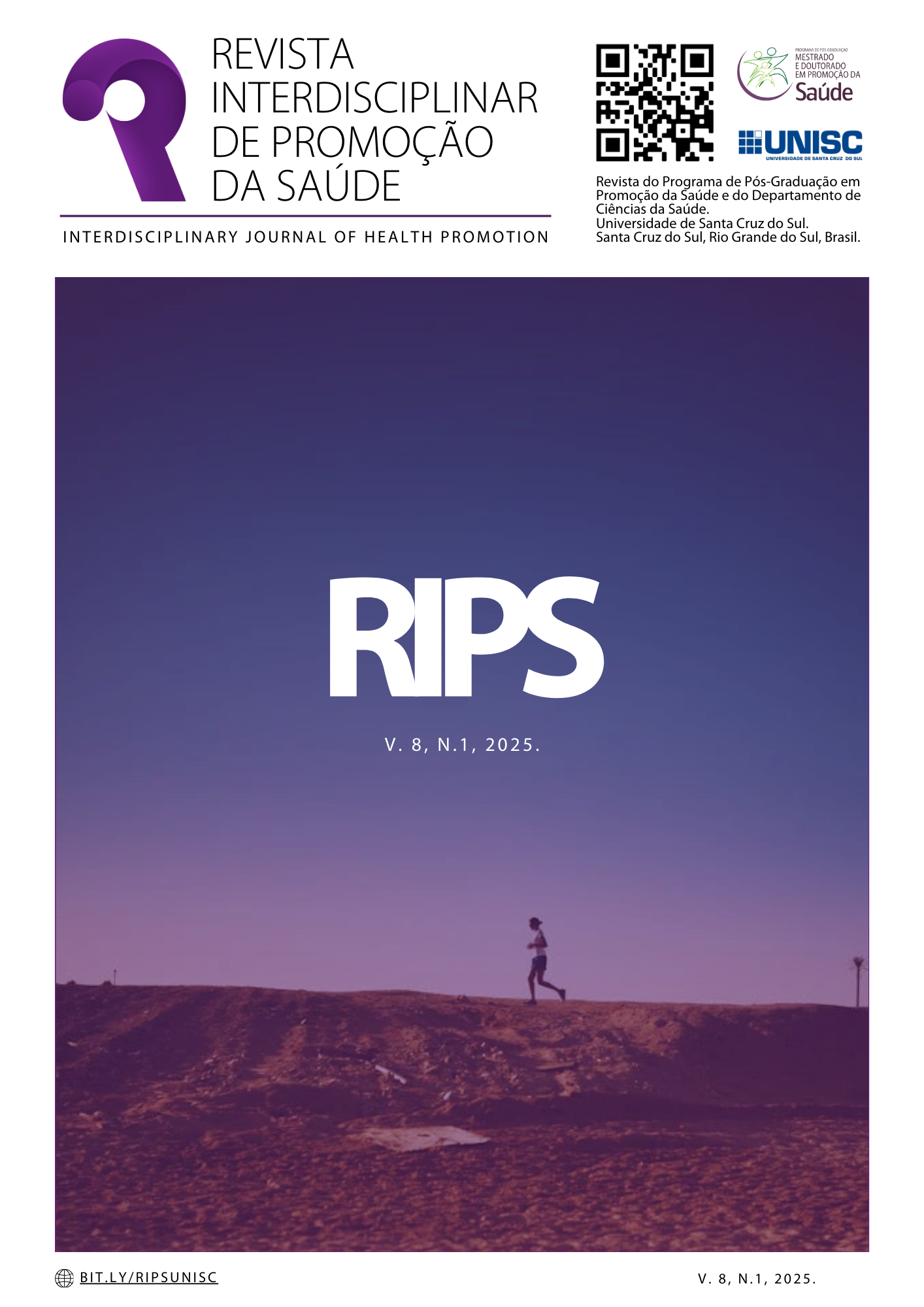Prevalence of dehydration in military pilots during flights: a systematic review
DOI:
https://doi.org/10.17058/rips.v8i1.19218Keywords:
Dehydration, Water stress, Pilots, Military personnelAbstract
Introduction: dehydration is the state of body water deficit due to primary losses or inadequate fluid intake. It may not be apparent until approximately 2% of body mass has been lost. According to the literature, even mild dehydration can affect cognitive performance. There are few studies on the amount of fluid loss in military pilots during flight. Objective: to understand the prevalence of dehydration in military pilots during flights, through a systematic literature review. Method: The systematic review was carried out following PRISMA recommendations. The searches were in the following databases: MEDLINE, SCOPUS, WEB OF SCIENCE, SCIENCE DIRECT and SCIELO. There were no language filters or time limits in the search. Risk of bias was determined through the Joanna Briggs Institute critical review. Results: a total of 5,830 studies were found in the systematic review. Next, 615 duplicate studies and 5,202 that did not meet the eligibility criteria were excluded. After reading 21 full texts, 5 studies were included in the systematic review. Conclusion: the results indicated that there is a prevalence of dehydration among pilots during military flights, with significant fluid loss rates, depending on the type of aircraft and flight time. The relationship between dehydration and cognitive performance was the most cited repercussion in most studies. Therefore, the greater the dehydration, the worse the cognitive performance of pilots is likely to be, which could have a critical effect on flight safety.
Downloads
References
Lieberman HR. Hydration and cognition: a critical review and recommendations for future research. J Am Coll Nutr 2007; 26(5 Suppl):555S-561S. doi: https://doi.org/10.1080/07315724.2007.10719658 PMID: 17921465.
Levkovsky A, Abot-Barkan S, Chapnik L, Doron O, Levy Y, Heled Y, Gordon B. Aviator's Fluid Balance During Military Flight. Aerosp Med Hum Perform 2018; 89(2):94-98. doi: https://doi.org/10.3357/AMHP.4920.2018. PMID: 2946335
Lindseth PD, Lindseth GN, Petros TV, Jensen WC, Caspers J. Effects of hydration on cognitive function of pilots. Mil Med 2013; 178(7):792-8. doi: https://doi.org/10.7205/MILMED-D-13-00013 PMID: 23820354.
Szinnai G, Schachinger H, Arnaud MJ, Linder L, Keller U. Effect of water deprivation on cognitive-motor performance in healthy men and women. Am J Physiol Regul Integr Comp Physiol 2005; 289(1):R275-80. doi: https://doi.org/10.1152/ajpregu.00501.2004 Epub 2005 Apr 21. PMID: 15845879.
Cheuvront SN, Kenefick RW. Dehydration: physiology, assessment, and performance effects. Compr Physiol 2014; 4(1):257-85. doi: https://doi.org/10.1002/cphy.c130017 PMID: 24692140.
Goldman, RF. Introduction to heat-related problems in military operations. In: Kent B. Pandoff KB, Burr RE, editors. Medical aspects of harsh environments. Office of The Surgeon General, Walter Reed Army Medical Center, Washington, DC; 2001. 3-49 p.
Carretero-Krug A, Úbeda N, Velasco C, Medina-Font J, Laguna TT, Varela-Moreiras G, Montero A. Hydration status, body composition, and anxiety status in aeronautical military personnel from Spain: a cross-sectional study. Mil Med Res 2021; 8(1):1-9. doi: https://doi.org/10.1186/s40779-021-00327-2 PMID: 34074350; PMCID: PMC8170814.
Brescon C, Pegaz PY, Godet P, Malgoyre A, Charlot K. Effect of Urinary Sheath Use on Hydration Status of Fighter Pilots Under Severe Thermal Stress: An Observational Study. Mil Med 2019; 184(3-4):e217-e222. doi: https://doi.org/10.1093/milmed/usy233 PMID: 30215767.
Page MJ, McKenzie JE, Bossuyt PM, et al. The PRISMA 2020 statement: an updated guideline for reporting systematic reviews. BMJ 2021; 372: n71. doi: https://doi.org/10.1136/bmj.n71. PMID: 33782057; PMCID: PMC8005924.
Peters MDJ, Godfrey C, McInerney P, Munn Z, Tricco AC, Khalil, H. Chapter 11: Scoping Reviews (2020 version). Aromataris E, Munn Z, editors. JBI; 2020. doi: https://doi.org/10.46658/JBIMES-20-12
Reardon M, Fraser B, Omer J. Physiological effects of thermal stress on aviators flying a UH-60 helicopter simulator. Mil Med 1998; 163(5):298-303. PMID: 9597845. doi: https://doi.org/10.1093/milmed/163.5.298
García-Mas A, Ortega E, Ponseti J, De Teresa C, Cárdenas D. Carga de trabalho e níveis de cortisol em pilotos de helicópteros de combate durante voos simulados. Rev Andal Med Deporte 2016; 9(1):7-11. doi: https://dx.doi.org/10.1016/j.ramd.2015.12.001
Schultz, MC, Schultz, JT, & Schultz, JJ. Female relief Systems in US military fighter ejection seat aircraft. JATE 2021; 10(2):1-15. doi: https://doi.org/10.7771/2159-6670.1220
Oliveira-Silva I, Boullosa DA. Physical Fitness and Dehydration Influences on the Cardiac Autonomic Control of Fighter Pilots. Aerosp Med Hum Perform 2015; 86(10):875-80. doi: https://doi.org/10.3357/AMHP.4296.2015 PMID: 265646
Tomes C, Schram B, Orr R. Relationships Between Heart Rate Variability, Occupational Performance, and Fitness for Tactical Personnel: A Systematic Review. Front Public Health 2020; 9(8):1-16. doi: https://doi.org/10.3389/fpubh.2020.583336 PMID: 33240835; PMCID: PMC7680786.
Downloads
Published
How to Cite
Issue
Section
License
A submissão de originais para este periódico implica na transferência, pelos autores, dos direitos de publicação impressa e digital. Os direitos autorais para os artigos publicados são do autor, com direitos do periódico sobre a primeira publicação. Os autores somente poderão utilizar os mesmos resultados em outras publicações indicando claramente este periódico como o meio da publicação original. Em virtude de sermos um periódico de acesso aberto, permite-se o uso gratuito dos artigos em aplicações educacionais e científicas desde que citada a fonte conforme a licença CC-BY da Creative Commons.




